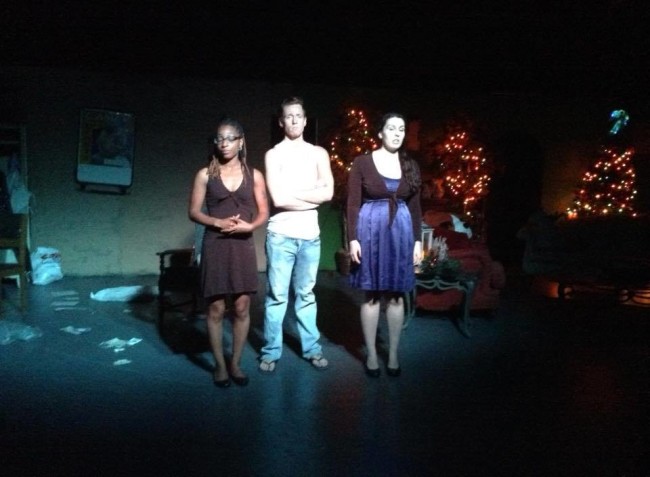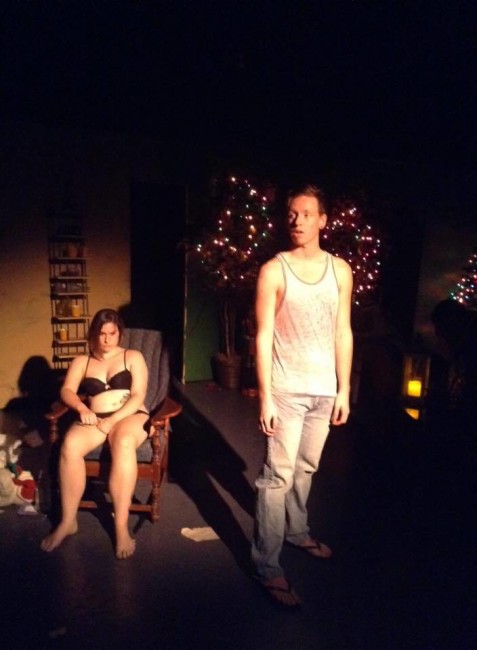In the war of their stories, the victims are the survivors. Sex-trafficking: an atrocity in society that most dismiss as something happening in third world countries, or only among the impoverished and mentally unstable here in their own country, is a topic needing a voice of political and community advocacy in the United States. WolfPack Theatre Company’s Founding Artistic Director and Playwright William Dean Leary has given voice to women who lived to escape such a war and tell the tale. Presented as a one-night performance as a part of over 60 events through the New Day Campaign, a campaign across Baltimore which is currently striving to end stigma and let the healing begin when it comes to things like Sex-Trafficking, Leary’s newest work Forsaken Angels is a powerful piece with a visceral and raw message laid bare for all to see. Stunning and provocative, the new work turns the mind to how such a thing could still actively be happening in the world in which we live.
New Day Campaign Founder and Director Peter Bruun encourages people across Baltimore to attend any number of events taking place over the course of 92 days. Covering some 16 exhibitions and 61 events all across Charm City, Bruun’s hope to help shift the mindset of how issues like Sex-Trafficking, Substance Abuse and Addiction, Homelessness and others just to name a few, are viewed, how the stigma attached to these matters hinders the road to recovery and what we as a community can do to help change that stigma to get on the path of healing and let a new day begin. Involving WolfPack Theatre Company with this autumn long campaign event shows the importance of the work being done within the company. Known for its edgier social plays that fill a hole in the community that needs to be addressed, WolfPack and its Founder are no stranger to works that address these subject matters in a hard-hitting and unflinching fashion.
The important focus of Leary’s work is the brutal reality of the situation. Leary stated in a pre-curtain speech before the night’s performance that the show “…was not focused through a Hollywood lens, it’s not been conceptualized…{but} is a real compilation of actual stories…it is not for sensationalism. This is reality.” Those simple words were not enough to prepare audiences for the brutal and shocking nature of explicit violence and sexual abuse— among other disturbing things— that happened throughout the course of the play. Leary’s work speaks a brass and disgusting truth that comfortable Americans are all too willing to turn a blind eye toward or look away from in hopes of not being confronted with this gruesome and heartbreaking reality.

Leary’s ability to construct real characters is jarring because of how heinous they are portrayed. In particular, Sam’s mother Jolene (as portrayed by Joanna Matthews with riveting aplomb and a shocking sense of rollercoaster emotions) is a prime example of the lifestyle that results from being sold into sex-trafficking. Her coarse abusive nature swells into raging maelstroms much like an uncontrollable tide. Leary’s penning of this character and Matthews’ delivery make it nearly impossible to stomach, the violence toward the character’s daughter Sam being so intense at various points throughout the performance.
The accolades of Leary’s research must be mentioned as well. In addition to interviewing survivors of sexual trafficking, and contacting resources from within the social institutions designed to provide aid and relief, Leary has constructed the perfect use of vocabulary for the situation. His use of the vernacular— turning out terms like “Johns, Romeo Pimp, and Bottom Bitch,” fall naturally into his exceptionally well-crafted dialogue. These terms may fall unfamiliar to many of the audience’s ears but during the modern reflective moments of the story, Leary finds delicate ways to introduce their meaning without feeling like a vocabulary lesson in the process.
Leary’s overall structuring and format of the piece is impressive and showcases his skills as a playwright. Setting the piece in memory and present recollection is the perfect vessel for stories such as these so that one does not bog down into the mire of interminable darkness. Watching Kelly Richards and Melanie Pino-Elliot play the two survivors, Audrey and Sam, in tandem moments with their younger selves (played with astonishing stage presence and exceptional heightened delivery by Brawnlyn Blueitt and Sara Castillo respectively) is harrowing. It is also a seamless juxtaposition of how memories are scars that never fade. Leary’s script work, keeping the moments in the present recollection scenes somewhat passive and poetic, serves as a biting contrast to what the younger girls experience in live action scenes.
The inclusion of Alex (played with haunting accuracy and unfathomable vulnerability by Dwayne Allen) is another layer in Leary’s carefully fabricated masterpiece. Not only is the focus of Sex-Trafficking brought to the forefront of the story, but Alex’s tale breaches the gender stereotype that only young women are abducted and forced into human sex slavery. Leary’s penning of Alex’s story is tragically beautiful and is a devastating reminder that finding a way out is not as easy as just doing so.

All eleven performers in the production do exceptionally well with the dialogue and scenes that Leary has written, driving home the importance of how detrimental Sex-Trafficking is, how the master manipulation of this trade has convinced thousands of young girls and boys that this is the only life they can ever know. A truly haunting and brutal story that should be seen and witnessed, the message is clear that this is still a very real problem right here in our own back yard that needs to be addressed.
Forsaken Angels played a one-night event as a part of the New Day Campaign event, a part of Free Fall Baltimore.
For more information on what’s coming up at WolfPack Theatre Company, visit their website
For more information on the New Day Campaign, visit their website
For more information on Free Fall Baltimore, visit their website


